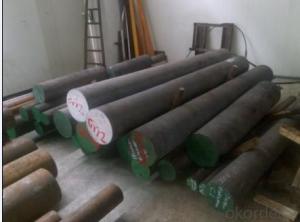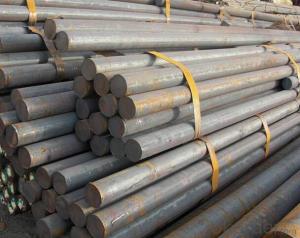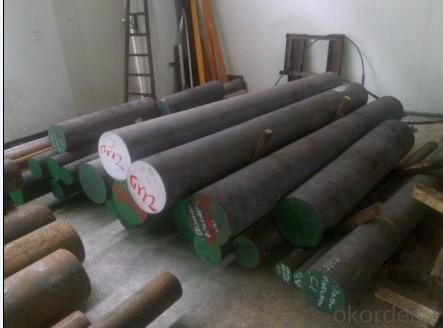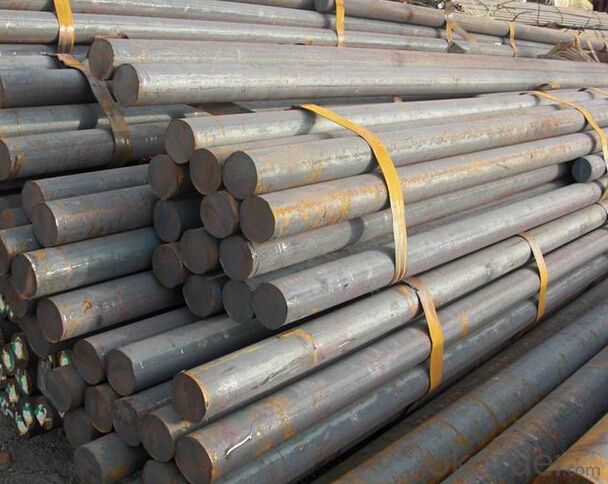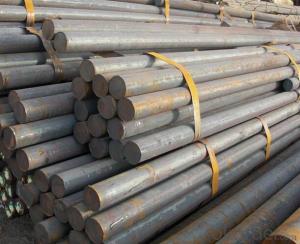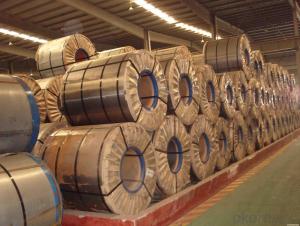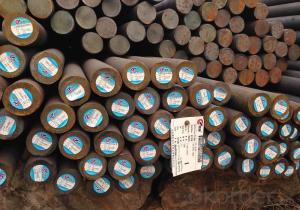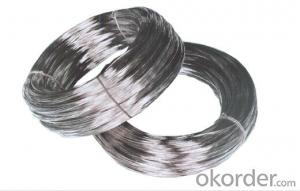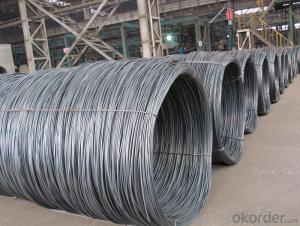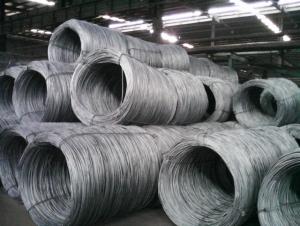Special Steel SCM435 Steel Rod / 4135 Steel Rod
- Loading Port:
- China main port
- Payment Terms:
- TT OR LC
- Min Order Qty:
- 25 m.t.
- Supply Capability:
- 10000 m.t./month
OKorder Service Pledge
OKorder Financial Service
You Might Also Like
Specification
The details of our Steel
1. Produce Standard: as the GB, AISI, ASTM, SAE, EN, BS, DIN, JIS Industry Standard
2. Produce processes: Smelt Iron -EAF smelt Billet - ESR smelt Billet -Hot rolled or forged get the steel round bar and plate
3. Heat treatment:
Normalized / Annealed / Quenched+Tempered
4. Quality assurance:
All order we can received Third party inspection, You can let SGS, BV,.. and others test company test and inspect our products before Goods shipping.
Product information
Chemical Composition(%) of 4135 steel rod | C | Si | Mn | P | S | Cr | Mo |
0.33-0.38 | 0.15-0.35 | 0.70-0.90 | ≤0.035 | ≤0.04 | 0.80-1.10 | 0.15-0.25 | |
Specification of 4135 steel rod | Dia.*L=14~200mm*4000~8000mm | ||||||
Application of 4135 steel rod | extrusion dies and die-casting for aluminu m,mandgnesium alloy mostly,for copper alloy could use mechaincal press forging of steel | ||||||
Payment Term of 4135 steel rod | L/C or T/T,30% in advance,70% before the shipment | ||||||
Main product
Plastic Mould Steel
DIN 1.2311,1.2738,1.2083,1.2316 etc.
AISI P20,P20+Ni,420 etc.
JIS SUS420J2
Hot Work Steel
DIN 1.2344,1.2343,1.2367,1.2365,1.2581,1.2713 etc.
AISI H13,H11,H10,H21, etc.
JIS SKD61,SKD6,SKD5,SKT4 etc.
Cold Work Steel
DIN 1.2739, 1.2601, 1.2080, 1.2436, 1.2631, 1.263, 1.2510, 1.2327 etc.
AISI D2, D5, D3, D6, A8, A2, O1 etc.
JIS SKD10, SKD11, SKD1, SKS3 etc.
High Speed Steel
DIN 1.3343, 1.3243, 1.3247, 1.3355 etc.
AISI M2, M35, M42, T1 etc.
JIS SKH51, SKH35, SKH59, SKH2 etc.
Alloy Structural Steel
DIN 1.7035,1.6511,1.7220,1.7225 etc.
AISI 5140, 4340, 4135, 4140 etc.
JIS SCr440,SNCM439,SCM435,SCM440 etc.
Stainless & Carbon Steel or Others
DIN 1.4125,1.1191 etc
AISI 440C,1045, 1020 etc.
JIS SUS440C,S45C etc
Product show

Workshop show

Shipping
1. FedEx/DHL/UPS/TNT for samples, Door-to-Door;
2. By Air or by Sea for batch goods, for FCL; Airport/ Port receiving;
3. Customers specifying freight forwarders or negotiable shipping methods!
Delivery Time: 3-7 days for samples; 5-25 days for batch goods.
Payment Terms
1.Payment: T/T, L/C, Western Union, MoneyGram,PayPal; 30% deposits; 70% balance before delivery.
2.MOQ: 1pcs
3.Warranty : 3 years
4.Package Informations: 1) EXPORT, In 20 feet (GW 25 ton) or 40 feet Container (GW 25 ton)
2)as customer's requirement
Why choose us?
(1) The leading exporter in China special steel industry.
(2) Large stocks for various sizes, fast delivery date.
(3) Good business relationship with China famous factories.
(4) More than 7 years steel exporting experience.
(5) Good after-sales service guarantee.
- Q: What are the advantages of using special steel in manufacturing?
- There are several advantages of using special steel in manufacturing. Firstly, special steel offers a higher level of strength and durability compared to regular steel. This is due to the presence of various alloying elements such as chromium, nickel, and manganese, which enhance the material's mechanical properties. As a result, special steel can withstand heavy loads, resist wear and tear, and endure extreme conditions, making it an ideal choice for manufacturing applications that require high strength and longevity. Secondly, special steel provides excellent corrosion resistance. The addition of alloying elements like chromium forms a protective oxide layer on the surface of the steel, preventing it from rusting or corroding when exposed to moisture or harsh environments. This corrosion resistance is crucial in industries such as marine, automotive, and construction, where the materials are constantly exposed to water, salt, and chemicals. Furthermore, special steel offers exceptional heat resistance and heat transfer properties. These properties are crucial in manufacturing processes that involve high temperatures, such as forging, casting, and heat treatment. Special steel can retain its strength and structural integrity even at elevated temperatures, allowing manufacturers to produce components that need to withstand extreme heat conditions. Another advantage of using special steel in manufacturing is its versatility. Special steel can be easily customized and tailored to meet specific requirements. It can be modified to exhibit various mechanical properties, such as hardness, toughness, or flexibility, depending on the application. This flexibility allows manufacturers to develop components with precise characteristics, ensuring optimal performance and efficiency. Lastly, special steel is often more cost-effective in the long run. Although the initial costs of special steel may be higher than regular steel, its superior durability and longevity result in reduced maintenance and replacement costs. Additionally, the enhanced properties of special steel can lead to improved energy efficiency and reduced material waste, contributing to overall cost savings in the manufacturing process. In conclusion, the advantages of using special steel in manufacturing include increased strength and durability, excellent corrosion resistance, superior heat resistance, versatility, and long-term cost-effectiveness. These benefits make special steel a preferred choice for various industries, ensuring the production of high-quality and reliable components.
- Q: What are the challenges in machining high-speed special steel?
- Machining high-speed special steel poses several challenges due to its unique properties and characteristics. One of the main challenges is its extreme hardness, which makes it difficult to cut and shape. High-speed special steel typically has a high carbon content and is heat-treated to enhance its hardness, which results in increased wear on cutting tools. The high hardness of this steel also leads to increased heat generation during machining, which can cause thermal distortion and affect the dimensional accuracy of the finished product. This requires the use of specialized cooling techniques and cutting tools with advanced coatings to dissipate heat and maintain stability. Another challenge is the brittleness of high-speed special steel. It tends to have low toughness and is prone to cracking and chipping during machining operations. This requires careful selection of cutting parameters, such as cutting speed, feed rate, and depth of cut, to prevent excessive stress and minimize the risk of tool failure. Additionally, high-speed special steel often contains alloying elements like tungsten, vanadium, and cobalt, which can further complicate the machining process. These elements increase the strength and wear resistance of the steel but also make it more challenging to machine. Specialized tool materials and cutting strategies are required to effectively machine these alloys and achieve desired surface finishes. Furthermore, the cost of high-speed special steel can be significantly higher than conventional steels, which adds to the challenges of machining. The high tooling costs associated with cutting tools necessary to machine this steel can be a significant investment. Overall, machining high-speed special steel requires advanced cutting techniques, specialized tooling, and careful consideration of cutting parameters to overcome the challenges posed by its extreme hardness, brittleness, and alloying elements.
- Q: How does special steel contribute to the textile industry?
- Special steel contributes to the textile industry by providing high-strength and durable components for textile machinery, such as looms, knitting machines, and textile processing equipment. The use of special steel in these machines ensures improved performance, precision, and longevity, thereby enhancing productivity and efficiency in textile manufacturing processes. Additionally, special steel's resistance to corrosion and wear helps maintain the quality and reliability of textile machinery, minimizing downtime and maintenance costs for manufacturers.
- Q: How does special steel contribute to the infrastructure development?
- Special steel contributes to infrastructure development in several ways. Firstly, its high strength and durability make it an ideal material for constructing buildings, bridges, and other critical infrastructure. Special steel can withstand heavy loads, extreme temperatures, and harsh weather conditions, ensuring the longevity and safety of these structures. Secondly, special steel is widely used in the manufacturing of machinery and equipment required for infrastructure development projects. From excavators and cranes to pipelines and power transmission systems, special steel provides the necessary strength, resistance to corrosion, and reliability needed for efficient and sustainable infrastructure development. Furthermore, special steel plays a crucial role in the transportation sector. It is utilized in the construction of railway tracks, road barriers, and vehicles, ensuring safe and reliable transportation networks. Special steel is also used in the energy sector for the production and distribution of electricity, as it is capable of withstanding high temperatures and pressure in power plants and transmission lines. In summary, special steel's strength, durability, and versatility make it an essential material for infrastructure development. Its contribution lies in the construction of robust structures, manufacturing of machinery and equipment, and the development of reliable transportation and energy systems, thereby facilitating the growth and progress of infrastructure worldwide.
- Q: How does special steel contribute to the industrial equipment industry?
- Special steel plays a crucial role in the industrial equipment industry by providing superior strength, durability, and resistance to various harsh conditions. Special steel alloys are specifically engineered to possess exceptional properties that make them suitable for a wide range of applications in industrial equipment. One of the key contributions of special steel to the industry is its ability to withstand high temperatures and pressure. This makes it an ideal material for manufacturing components such as boilers, turbines, and heat exchangers. Special steel's high heat resistance ensures that these equipment can operate efficiently and reliably in demanding environments, thereby enhancing overall performance and safety. Furthermore, special steel is renowned for its excellent corrosion resistance, making it highly suitable for manufacturing equipment that comes into contact with corrosive substances. This includes chemical processing equipment, oil and gas pipelines, and marine structures. By using special steel in these applications, the industrial equipment industry can ensure longer operational lifetimes, reduce maintenance costs, and minimize the risk of catastrophic failures. Special steel also contributes to the industry by enabling the production of equipment with superior mechanical properties. Its unique composition and heat treatment processes allow for increased strength, toughness, and wear resistance. As a result, industrial equipment made from special steel can handle heavy loads, endure extreme conditions, and provide long-lasting performance. Additionally, special steel alloys can be tailored to meet specific requirements, allowing for the production of custom-made components. This flexibility enables the industrial equipment industry to design and manufacture equipment that meets the exact needs of various sectors, including aerospace, automotive, energy, and construction. Special steel's versatility and adaptability thus play a vital role in driving innovation and technological advancements within the industry. In conclusion, special steel significantly contributes to the industrial equipment industry by providing exceptional strength, durability, resistance to harsh conditions, and customized solutions. Its unique properties make it an essential material for manufacturing a wide range of equipment, ultimately enhancing performance, reliability, and safety across various sectors.
- Q: How is special steel used in the marine industry?
- Special steel is used in the marine industry for various applications due to its exceptional strength, corrosion resistance, and durability. It is commonly used for constructing ship hulls, propeller shafts, and other structural components that require high strength and resistance to harsh marine environments. Additionally, special steel is utilized in manufacturing marine equipment like anchors, chains, and offshore structures, ensuring their reliability and longevity.
- Q: What are the applications of tool steel?
- Tool steel has a wide range of applications due to its high hardness, resistance to wear, and ability to retain sharp edges. It is commonly used in the manufacturing of cutting tools, dies, molds, and machine components that require high strength and durability. Additionally, tool steel finds its use in the automotive, aerospace, and construction industries, where its properties are crucial for efficient and precise operations.
- Q: What are the properties of mold steel?
- Mold steel is known for its excellent hardness, wear resistance, and ability to withstand high temperatures. It possesses good machinability and can be easily polished or textured to create intricate mold designs. Mold steel also exhibits high toughness and dimensional stability, ensuring long-lasting and precise molds. Additionally, it is resistant to corrosion and offers good heat conductivity, making it suitable for various molding applications in industries such as automotive, aerospace, and consumer goods.
- Q: How does special steel contribute to the aerospace turbine industry?
- Special steel plays a crucial role in the aerospace turbine industry as it offers exceptional strength, corrosion resistance, and high-temperature stability required for the demanding operating conditions of turbine components. It enables the production of turbine blades, discs, and other critical parts that can withstand extreme temperatures and stresses, ensuring optimal performance and safety in aircraft engines. Additionally, special steel's excellent fatigue resistance and ability to retain mechanical properties at elevated temperatures contribute to enhanced fuel efficiency and durability, ultimately advancing the overall efficiency and reliability of aerospace turbines.
- Q: What are the properties of titanium alloys?
- Titanium alloys have several notable properties, including high strength-to-weight ratio, excellent corrosion resistance, and good biocompatibility. These alloys also exhibit high temperature stability, low thermal expansion, and great fatigue strength, making them suitable for a wide range of applications in industries such as aerospace, automotive, and medical.
Send your message to us
Special Steel SCM435 Steel Rod / 4135 Steel Rod
- Loading Port:
- China main port
- Payment Terms:
- TT OR LC
- Min Order Qty:
- 25 m.t.
- Supply Capability:
- 10000 m.t./month
OKorder Service Pledge
OKorder Financial Service
Similar products
Hot products
Hot Searches
Related keywords
